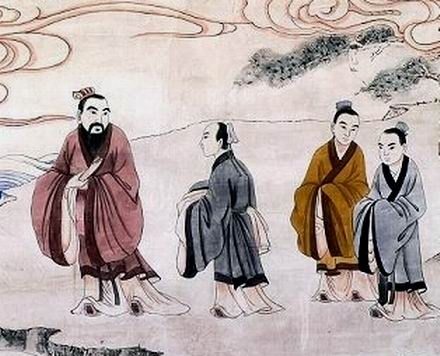5.6 Confucius dislikes hypocrisy
子曰、巧言令色、足恭、左丘明恥之、丘亦恥之、匿怨而友其人、 左丘明恥之、丘亦恥之。
The Master said, ‘Fine words, an insinuating appearance, and excessive respect;– Zuo Qiuming [Tso Ch’iu-ming] was ashamed of them. I also am ashamed of them. To conceal resentment against a person, and appear friendly with him;– Zuo Qiuming was ashamed of such conduct. I also am ashamed of it.’
* * *
People thinks a saint or an enlightened master has no dislike. Yet Jesus was angry when seeing merchants yelling in the sacred temple. And similarly, Confucius did not like people who pretend to be saintly on the outer appearance but have hidden agenda inside. This illustrates our nature of being a human: While we share the same origin of united reality, as separated beings we are subjected to our animal natures and emotions. Buddhists say the same. The meaning of a Bodhisattva (enlightened being who remains in the world for service after liberation) is: aware and be loving-kindness, not departing from the world and perceiving nothing. Therefore, on the pathway of spiritual cultivation, if we are proceeding properly, we should be getting a clearer and clearer understanding about ourselves, including our body, emotions, thoughts, and consciousness, and not ignorance and oblivious of them. Understanding one self, therefore, is an important and inevitable step in spiritual cultivation.
5.6 巧言令色、足恭、左丘明恥之、丘亦恥之
子曰、巧言令色、足恭、左丘明恥之、丘亦恥之、匿怨而友其人、 左丘明恥之、丘亦恥之。
* * *
谈到圣人或者有道的人,人们会想到他们应该没有负面的情绪,或者认为他们应该没有不喜欢的人和事。 然而,当耶稣在教堂里看到了商人在神圣的地方喧闹时,他生气了。 同样,孔子也不喜欢表里不一的人,以他们为耻。 这说明了,其实我们人,虽然有着相同和统一的起源,但作为独立的人时,我们还是会有动物的本性和情感的。 佛家也讲,菩萨(得道后留在世间服务的神明) 是觉悟有情,不是离开无情。 所以,修道的道路中,如果我们进行得当,应该会越来越清楚我们的自己,包括身体,情感,思想,和意识; 而不是越来越什么都不知道。 所以,认识自己,是修行中重要和必要的一步。


Leave a Reply